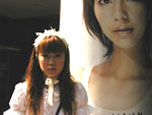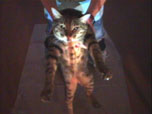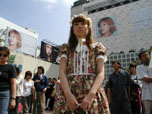


 |
 |
 |
|
Welcome to the 21st century '2,843 people were blown to hell when a fireball hit the World Trade Center. It was such a beautiful sight. A beer in one hand, I was glued to the TV. Everything's going crazy. That's why I peep at the corpses under the rubble.' Open your browser on www.peeptvshow.net and these are going to be your welcoming lines... Describing himself as a media activist, Yutaka Tsuchiya expands his palette to feature filmmaking with a debut highly representive of the hyper-vital DV low budget trend in young Japanese cinema. Starting from the assumption that 'the borders between inner and outer worlds have blurred', Yutaka aptly uses the post-September 11 worldwide trauma to powerfully expose the alienation and loss of grip on reality experienced by social outcasts in Shibuya, Tokyo. The implosion of identity, hopeless lack of self-confidence and detachment from 'normal life' are virulentry sketched, not just as a marginal syndrome limited to helpless freaks, but played out on a grand scale as the fast-spreading epidemic that plagues the new society of advancing globalisation, empty consumerism, media-set agendas and internet-based contact. Rough, harsh, raw and sometimes crude, PEEP "TV" SHOW build up a very lose and always open narrative through a galloping ride towards the first anniversary of September 11. Compulsive digital voyeur Hasegawa and 18-year-old sucidal Moe team up on an unpredictably successful (and profitable) experiment, offering on the PEEP "TV" SHOW website something people seem to be craving for REAL. Images captured through house windows by hidden cameras, violently dark excerpts from Moe's diary, a day-by-day chronicle of the movements of one of the perpetrators of the WTC terrorist attack all mix into an inhomogeneous and disparate magma. The film itself restlessly blurs boundaries and mixes widely disparate elements, thus forcing the viewer to always question the images he's shown and making him/her feel boxed inside the same never-ending nightmare the protagonists are lost in. offering a wide-angle and unconventional perspective on utterly complex subjects and adventurously experimenting with the possibilities of digital in every respect (acting, sound, editing, camera style), PEEP "TV" SHOW is no doubt a one-of-a-kind cinematic experience and an encouraging sign of things to come from Yutaka Tsuchiya. [Paolo Bertolin] |
| Raw, cheap and bravura video film that does not pay much attention to the boundary that apparently exists between fiction and reality. With and about a gothic girl and other kids from Shibuya, Tokyo, obsessed by the Internet, looks and security cameras. Raw, authentic and ostentatiously low budget, with low-grade images, this DV feature dissolves the borders that supposedly separate fiction from reality. Centred on the generation of kids that hang out on the streets and small apartments around Shibuya, in Tokyo, Yutaka Tsuchiya's film captures two months of the strangely dislocated lives of these young people. No family life is hinted at, they often live alone and isolated in cubicle like apartments. Obsessed by the internet, by surveillance cameras, at home with internet porn, always dealing with sex but at the same time strangely sexless, but caught up in numerous forms of peeping in which they peep and in turn become somebody else's spectacle, this is a generation for which fashion statements are not just a way of life, but their very being and identity. Yutaka scripted Peep "TV" Show in collaboration with a 'goth' girl, her street style half way between vampire and shepherd girl Bo Peep. The film radiates authenticity as it follows several diverse characters through their night and day life in the electronically wired, digital neon city of surfaces and screens. If it is a film more of encounters and an accumulation of incidents than a concluding narrative, it is the better to describe and offer a real vision of this extraordinary society of the spectacle in this urban, young people's world. [Simon Field] |
| A portrait of alienated cyber-youth, Peep "TV" Show is so much of the moment so hyperbolically trendy, even that it risks becoming dated overnight. But as a fiction with a quasi-documentary flavour, Yukata Tsuchiya's panorama of a voyeuristic technological culture makes for revealing and intermittently urgent viewing. Its essayistic thrust and defiantly lo-fi DV execution will make it extremely tough to distribute, but it should find a niche with festivals having won the FIPRESCI award at Rotterdam - and at venues specialising in new media and pop-culture experimentation. The film is built around two characters who appear, judging from the press notes, to be thinly disguised versions of its leads. Hasegawa a long-haired, facially-pierced young man - spends his days on the streets of Tokyo's Shibuya district, secretly filming passers-by with his camcorder. He also spies on local inhabitants, posting footage of them on his website, which also serves as a vehicle for his musings on September the 11th. He finds a kindred spirit in Moe (Gezchof), a young woman who dresses in the cult fashion known as Gosloli, or Gothic Lolita; she volunteers to have her everyday existence webcast live on the site. Other characters include a traumatised middle-aged salaryman, Hasegawa's porn-obsessed co-worker, and Moe's friend Nagomi (Akiko Ueda), who posts murderous thoughts on her weblog. Not so much a narrative film as an imaginative essay on the media-saturated condition of modern Japan, Peep "TV" Show is distinctive for its use of real people effectively playing themselves, and encouraged to improvise. For example, Mamoru Kouyama, who plays a shy agoraphobic, himself did not leave his room for five years. Shot on digital video, the film uses the imperfections of the medium to vivid effect, manipulating split-screens, text and website images; shooting in Tokyo's streets and subways imparts a nervous kinetic immediacy. There is much intriguing sociological insight into the Gothic Lolita cult, in which young women dress like frilly Bo Peep dolls, with Moe explaining articulately how the style enables her to find a confident sense of identity. Despite some frenzied early material cut to ear-splitting noise guitar, much of the mood is introverted, even oppressive. Although the surveillance-style material looks a little over-familiar, individual images startle; in particular, viewers may blanch at a distressingly realistic-looking sequence in which a cat is asphyxiated in a plastic bag, while website users vote on whether or not it should survive. The film may well be acute in its diagnosis of a lost generation of Japanese youth, and certainly sheds interesting light on the way that Japan views the effects of September 11. But it is hard not to feel that the film's traumatised lead duo have narcissistically appropriated the catastrophe for their own emotional purposes: posing in front of a projection of the collapsing Twin Towers, they muse: "This is our Ground Zero". It is hard to sustain sympathy with characters who seem so much like disturbed poseurs, but the sense that they are at least partly real gives this odd, restless document a distinctly abrasive edge. [Jonathan Romney / Screen Daily] |
|
FIPRESCI - The international federation of film critics Midnight Eye Variety Film Threat Like Anna Karina's Sweater POTS cuttingedge The Link The Japan Times
|











